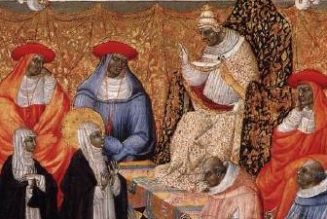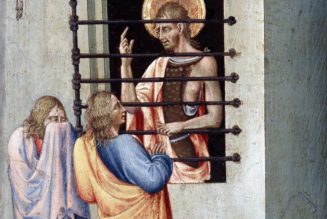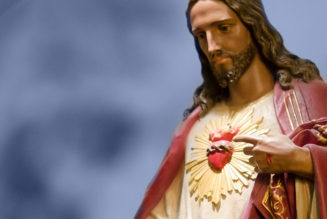, September 10, 2020

“I love Christianity! There is no revenge!”
That is what an Iranian convert joyfully announced in RCIA class, according to Father Emmerich Vogt, O.P.
It’s true; revenge is a demand of many cultures and a dark impulse of the human heart that feels impossible to resist. Jesus this Sunday, the 24th Sunday of Ordinary Time, not only commands his followers not to seek revenge, but opens up an entirely new reward system. No longer will we take an eye for an eye and a tooth for a tooth — but we will get mercy for mercy, love for love.
When Peter offers that he might be willing to forgive seven times, he is being generous.
He doubles the “three strikes, you’re out” rule that prevails in some accounts of mercy in the Law, and he does it by naming the number of “completeness,” seven. But Jesus surprises him with his answer: “I say to you, not seven times but seventy-seven times.”
To illustrate the point Jesus tells the parable of the Unforgiving Servant who owes a “huge amount.” According to most translations of the passage, the amount he owes is 10,000 talents, something like $6.6 trillion, since a single talent is 20 years’ wages.
Once he is forgiven he meets another servant who owes only 100 denarii, a single day’s wages for a laborer — maybe $128 today. When he won’t forgive the smaller debt, his master reinstates the servant’s original debt. Now he owes everything again, and it is unpayable.
The difference between the amount the servant owes and is owed in the parable is extreme, because the difference is extreme in our lives.
We each owe God far more than $6.6 trillion, because that much money couldn’t buy all he has given us: Our free will and intellect, the ability to choose and know and remember, plus every good thing we have ever had or ever will have, plus every loved-one and every kindness, plus every color in our garden, every song, every poem, every good true and beautiful thing we ever have or will ever marveled at — every joy, every accomplishment, every comfort.
And not just that.
We owe him even more, because with every sin we took what God gave us and handed it to his enemy. We took the gift of free will and enslaved it to sin. We took the gift of our intellect and used it to plot against God. We filled our memory with sinful pleasures so that we could return to them again and again. We repaid good with evil, kindness with selfishness. We chose the false beauty of sin over the true beauty of God’s will.
And not just that.
God not only forgave our debt, he handed himself over to the jailers and torturers in our place to pay our debt for us, dying and rising to place us on the shore of an ocean of mercy.
If we repent like the servant in the story — if we fall down, do him homage, and pray, “Be patient with me, and I will pay you back in full,” we will be forgiven.
But the next part of the story applies to us also.
He sounds dastardly in the story, but we all do what the Unforgiving Servant does. We find a neighbor who owes much less to us, because their sin isn’t against their creator and redeemer, but only against a mere human being. They have offended us by something they said or didn’t say. Perhaps they caused us financial hardship. Maybe they offended us at home, or maybe they got crosswise with us at work too many times.
At any rate, we are done with them. We don’t forgive them. We don’t speak with them if we don’t have to. We can hardly even pray for them. We say with our words or with our silence, “You can never pay back what you owe.” Like the servant in the parable, we put them into a prison at least in our hearts until they make up what they did; an impossible situation for both of us.
It is an absurd way for us to behave, because it not only denies who our neighbor is; it denies who God is.
St. Paul describes who we are in the Second Reading. “None of us lives for oneself, and no one dies for oneself,” he says, “For if we live, we live for the Lord, and if we die, we die for the Lord; so then, whether we live or die, we are the Lord’s.”
So when we deny forgiveness to our neighbor, we are doing the same thing we do when we sin: Treating God’s gifts as our own possession to use according to our will, not his.
Nothing is ours. Our goods aren’t ours, our fate isn’t ours, and it isn’t our place to judge those who offend us. All is God’s.
“Could anyone nourish anger against another and expect healing from the LORD?” asks the First Reading, from Sirach. “If one who is but flesh cherishes wrath, who will forgive his sins? Remember your last days, set enmity aside; remember death and decay, and cease from sin!”
This is the fifth petition of the Our Father: “forgive us as we forgive others.” The Catechism calls it “astonishing,” and St. John Paul II said “is this not perhaps the most difficult petition of the ‘Lord’s Prayer,’ precisely because what is asked of us is so clear and uncompromising?”
This is hard. It’s hard to forgive. But look at what Christians in our day are doing, despite a culture of revenge.
In 2015, Egyptian Coptic Christians who were working as migrant laborers in Libya were captured by ISIS and beheaded, and their killings were broadcast in a video shared around the world.
When reporters interviewed their families, their answers were an extraordinary lesson in Christian forgiveness.
Bishop Felobous, who was related to five murdered laborers, told a reporter: “Their leaving is painful. But we are not sad. We are proud of our martyrs. I congratulate ISIS. God is using them to bring martyrs to the world. Everything happens for a reason. I was very sad when I heard the news of the air strikes lead by the Egyptian military against ISIS. God asks us to even love our enemies.”
The mother of 24-year old murdered laborer Abanoub Ayiad said, “May God forgive ISIS for the pain and suffering we have been through. I gave the best gift to God. My son.”
The one I find most painful and most inspiring were the words of a child, shown above, the daughter of Maged Shehata. “My father died like a lion. He did not bow his head down,” she said. “I am now from the city of the martyrs. The city of the brave lions. May God forgive the killers. We don’t have hatred towards them — this is Christianity. God forgives the sinners; so shall we.”
When we meet Jesus Christ in the afterlife, he will look at what we have done with what he gave us. Then he will look at how we treated those who took valuable things away from us.
Only those who answer like that laborer’s daughter will be worthy of the even greater gift he has in store.
Tags: 24th Sunday in Ordinary Time Year A, prayer, Sunday Gospel, Sunday Readings
Never miss a post! Subscribe below to our weekly newsletter.








